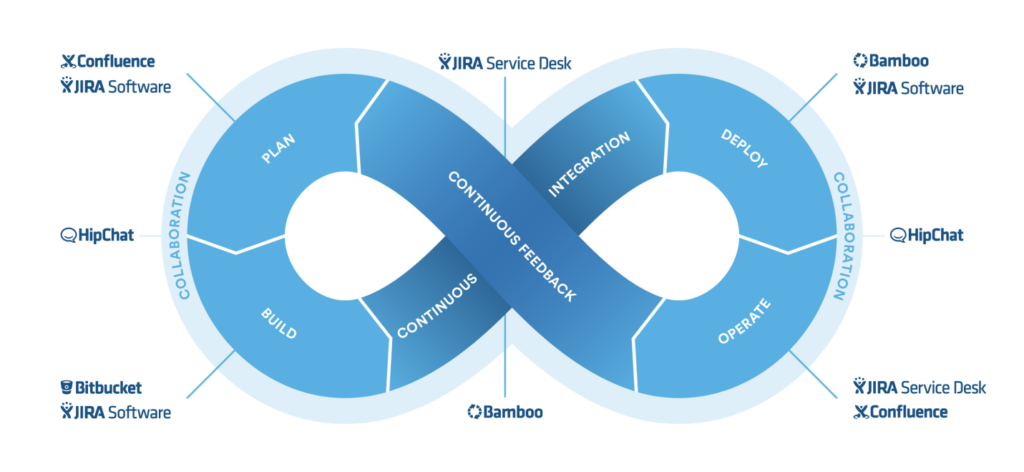One key to making sure your DevOps journey is a successful one is ensuring you have the right tools to support automation, collaboration, and communication among teams.
Atlassian put together a buyer’s guide for DevOps tools, which is broken down into six phases: planning, building, continuous integration, deployment, operation, and continuous feedback. We have pulled out some of the key points for each stage including the tools Atlassian actually uses:
1. Plan
This is where you are going to start laying the groundwork, so keep in mind:
- Planning in iterations and sprints can be an effective way to implement changes.
- Seek user feedback on a regular basis and organize it into actionable items for your team. Atlassian talks about “asynchronous brainstorming”, making sure that everyone is able to comment on ongoing projects, strategies, goals, roadmaps, and ideas.
The tools Atlassian uses are Confluence, HipChat, and Jira Software.
2. Build
- Staging: Coding against virtual and disposable replicas enables teams to accomplish more, address flaws in real time, and work in identically provisioned environments for maximum transparency. The tool Atlassian uses is Docker.
- Infrastructure as Code: Provisioning code gives teams increased flexibility, repeatable processes, and reliable systems that they can easily test, review, and incorporate into CI. The tools Atlassian uses are Bamboo, Bitbucket, Chef, Docker, and Puppet.
- Collaboration: Take full advantage of pull requests, which inform your team about proposed changes and give them the opportunity to review them before they are integrated into the main code line. The tools Atlassian uses are Bamboo, Bitbucket, Chef, Docker, and Puppet.
3. Continuous Integration
- Integration: Prioritize tools that remove the hassle that can come with running CI with your team by automatically applying tests, giving you the option to push changes to master when they have been successful in the branch build, and providing alerts. The tools Atlassian uses are Bamboo and Hipchat.
- Testing: Automating your testing processes not only makes things easier, but also increases awareness so your teams can effectively mitigate risks. The tools Atlassian uses are Bamboo, Hipchat, and Capture for Jira.
4. Deploy
- Dashboards: Single integrated dashboards gives your teams full visibility into pull requests, branches, builds, warnings, and more. The tool Atlassian uses is Jira Software.
- Automation: The right tools should reduce the headaches that can come with standardizing environments and orchestrating complex deployments by providing simple controls and step-by-step transparency. The tools Atlassian uses are AWS, Bamboo, Hipchat, and Puppet.
5. Operate
- Application and Server Performance Monitoring: Watch for tools that will do these tasks automatically, with some being able to audit both applications and servers while others specialize in only one. The tools Atlassian uses are BigPanda, Hipchat, HostedGraphite, Nagios, New Relic, Pager Duty, Pingdom, and Splunk.
- Communication and Swarming: Inter- and intra-team communication is crucial. By setting up chat rooms, the right team members can respond to issues rapidly and ensure they are taken care of. The tools Atlassian uses are BigPanda, DataDog, Hipchat, New Relic, Pager Duty, and Statuspage.
- Incident, Change, and Problem Tracking: A major roadblock within and between teams happens when issues are not reported and monitored in the same place. The ideal problem-tracking tool will keep everything on one platform for faster fixes. The tools Atlassian uses are Jira Service Desk and Jira Software.
6. Continuous Feedback
There are a range of ways you can get feedback from users including bug reports, churn or support surveys, social media, and more.
The key is to listen to what you are hearing and again look for tools that integrate chat functions and feedback platforms.
When looking for DevOps tools for your organization, make sure you break down these production silos to better understand what your teams need at each step in order to collaborate, innovate, and evolve.
Get Expert Support to Unlock the Potential of Your DevOps Tools
To make your DevOps transition a successful one, work with Elasity’s experts to:
- Optimize and customize your Atlassian applications, configuring them to suit your requirements.
- Integrate applications and add-ons securely and seamlessly.
- Take advantage of administrative, functional, and consulting support to help users stay on top of best practices and get the most out of their tools.
We will help you onboard your teams and accelerate the process—enabling you to exploit the full value of Atlassian’s suite of tools.
Before you start, reach out to Elasity for assistance in configuring the Atlassian Suite. As an Atlassian Solutions Partner, we offer Atlassian Atlassian Administration & Functional Support (AFS), to help best configure and implement the Atlassian suite with best-practices. Contact us to get started today!
Read more:
- 5 Benefits of Hosting Atlassian Server Applications on AWS
- eBook | Unleashing Atlassian Data Center on AWS: 4 Must-Read Considerations For Success
- Atlassian Announces Atlassian Stack for the Enterprise
- 3 Reasons You Need Atlassian Data Center - February 26, 2019
- Atlassian’s 5-Step Guide to Creating an Incident Communication Plan - November 14, 2018
- 4 Tips to Maximize DevOps Success While Ensuring Regulatory Compliance - September 5, 2018


